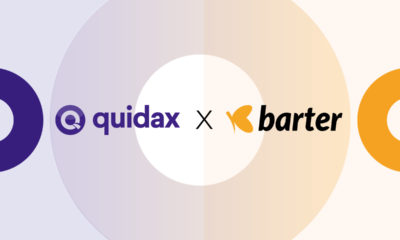Every week, we search for news taking place in Africa’s crypto and blockchain space and bring the best stories to you. Below are our top picks this week, including the #EndSARS movement’s reliance on bitcoin donations.
#EndSARS Movement Turns to Bitcoin Donations
The #EndSARS movement in Nigeria has now turned to bitcoin after experiencing difficulties receiving donations through conventional means. One of the organisations that are raising money for the campaign is now receiving bitcoin donations only.
The Feminist Coalition wrote on Twitter: “We are moving to only [accept] bitcoin using BTC Pay. BTC Pay is a free, secure, decentralised, and censorship-resistant platform, which makes it our best option given the past few days.”
On October 13, 2020, the organisation reported that the mode of payment it was using to receive donations was down. “The Flutterwave links are not working right now,” the organisation stated on Twitter. The coalition had been relying on Flutterwave to receive donations. Flutterwave is a payment platform in Nigeria that offers payment links to businesses as one of its solutions.
Nigerians on Twitter suspected that the Central Bank of Nigeria (CBN) was behind the Flutterwave issue. However, it is unclear if the regulator had a hand in the matter. What is clear, though, is that Twitter users advised the Feminist Coalition to move to bitcoin and they listened.
Furthermore, the tweet below shows that the organisation could have had trouble receiving bank transfers as well.
The campaign in Nigeria against police brutality highlights the importance of crypto amid government censorship. At a time when some protesters are incurring injuries or dying, donations are important for medical care and funeral arrangements. Without a method to receive donations, the protesters would have probably suffered greatly. However, crypto donations have kept the campaign going. That means that Nigerians can continue fighting for fairness and a better nation.
Kenya’s UTU Coin Sells Out in Minutes During Crowd Sale

A DeFi project based in Kenya sold out its token in five minutes during a crowd sale. UTU held the crowd sale on 14 October 2020 to build trust infrastructure as a service. The founder and CEO of UTU, Jason Eisen, found inspiration to start the project because people do not always trust ratings from strangers.
Reacting to the crowdsale, Eisen said: “That was incredible! It [only took] a couple of minutes [to sell the token]. Now onward and upward!”
After a successful crowd sale, UTU will proceed to list on the Uniswap Protocol on 16 October 2020. Note that the amount that the company raised is undisclosed.
In 2019, UTU held an initial DEX offering on the Binance decentralised exchange.
The UTU Project
According to its light paper, UTU conducted a survey to find out what people think about service recommendations. “We discovered that people often do not care very much about ratings of people they do not know. We asked thousands of people […] who might influence their decision regarding choosing one service from another, and some 92 percent answered: I trust myself, my family, and most of my friends,” UTU stated.
The project aims to create a trust economy. Therefore, the company will create a platform that delivers recommendations “based on users’ and providers’ social relationships and other data.” Also, the platform will have a blockchain-based protocol where users can make verifiable recommendations about a service.
Users will earn UTU tokens for participating on the platform. The tokens will give them the right to vote for the governance of the UTU trust mechanism.
The trust infrastructure will also have trust oracles that lenders can use to examine the creditworthiness of borrowers. The goal of this feature is to eliminate over-collateralisation.

 Features3 years ago
Features3 years ago
 Bitcoin2 years ago
Bitcoin2 years ago
 Features3 years ago
Features3 years ago
 Features3 years ago
Features3 years ago
 Features3 years ago
Features3 years ago
 Features3 years ago
Features3 years ago
 Features3 years ago
Features3 years ago
 Features7 months ago
Features7 months ago



















 Central African Republic (CAR) has set up a 15-member committee that will be responsible for developing a bill on the use of cryptocurrencies and tokenization in the region.
Central African Republic (CAR) has set up a 15-member committee that will be responsible for developing a bill on the use of cryptocurrencies and tokenization in the region.
